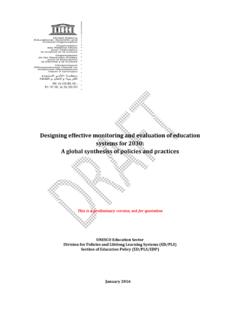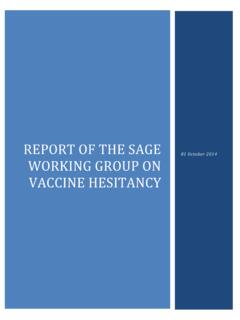Transcription of Early Childhood Education: Equity, Quality and Transitions
1 Early Childhood Education: Equity, Quality and TransitionsREPORT FOR THE G20 EDUCATION WORKING GROUP Early Childhood Education: Equity, Quality and Transitions report for the G20 Education Working Group . PUBE 2 | Early Childhood EDUCATION: EQUITY, Quality AND Transitions Early Childhood EDUCATION: EQUITY, Quality AND Transitions OECD 2020 This work is published under the responsibility of the Secretary-General of the OECD. The opinions expressed and arguments employed herein do not necessarily reflect the official views of OECD member countries. This document, as well as any data and map included herein, are without prejudice to the status of or sovereignty over any territory, to the delimitation of international frontiers and boundaries and to the name of any territory, city or area.
2 The statistical data for Israel are supplied by and under the responsibility of the relevant Israeli authorities. The use of such data by the OECD is without prejudice to the status of the Golan Heights, East Jerusalem and Israeli settlements in the West Bank under the terms of international law. The use of this work, whether digital or print, is governed by the Terms and Conditions to be found at OECD 2020 PARTICIPATION AND EQUITY IN Early Childhood EDUCATION | 3 Early Childhood EDUCATION: EQUITY, Quality AND Transitions OECD 2020 High- Quality Early Childhood education supports the social and emotional well-being of the youngest members of our societies.
3 Children who benefit from Quality Early Childhood education (ECE) are more likely to do well at school, and later, in the labour market. Recognising the importance of ECE for individuals and societies, the G20 countries have made it an increasingly prominent topic of their cooperation. In 2018, the Argentinian G20 Presidency and in 2019, the Japanese G20 Presidency, highlighted the importance of prioritising investment in Early Childhood programmes and promoting equitable access to support more prosperous societies. Building on this work, a central topic of the G20 Education Ministerial Meeting in 2020 convened by the Saudi G20 Presidency is how to realise the potential of ECE to promote equal opportunities for all.
4 The focus on ECE by the Saudi G20 Presidency reflects the overarching theme of the Saudi G20 Presidency: Realizing Opportunities of the 21st Century for All. One of three core aims is to advance the agenda of human empowerment, with a view to creating the conditions where all people - especially women and young people - can live, work and thrive . Given the central importance of education to this vision, the Saudi G20 Presidency convened - for the second time a G20 Educational Ministerial in September 2020. This report was developed by the OECD at the request of the Saudi Presidency of the G20 to inform the discussion at the G20 Education Ministerial Meeting.
5 The report synthesises OECD and other international research on good practice in ECE and brings together international data to outline trends in G20 countries. Andreas SCHLEICHER Director for Education and Skills and Special Advisor on Education Policy to the Secretary-General Foreword 4 | Early Childhood EDUCATION: EQUITY, Quality AND Transitions Early Childhood EDUCATION: EQUITY, Quality AND Transitions OECD 2020 Introduction The role of Early Childhood education and care in realising opportunities of the 21st century for all Research from neuroscience shows that during the Early years of a child s life - from birth until around six years - their brain has extraordinary capacity for learning.
6 By the time a child is six, the same time most Early Childhood education programmes end, their brain has already reached about 90% of its adult volume (Stiles and Jernigan, 2010[1]); (Shuey and Kankara , 2018[2]). Early Childhood education and care therefore spans a critical window for development which sets the foundation for later success in school, career and life ( unicef , 2019[3]). High Quality Early Childhood education and care has been shown to provide a wide range of benefits for individual children especially the most disadvantaged. These benefits include supporting social and emotional well-being, lowering risks of school dropout and even contributing to higher learning and employment outcomes later in life (OECD, 2017[4]); ( unicef , 2019[3]).
7 Children s participation in Early Childhood education and care also offers greater opportunities for mothers and other caregivers to participate in the workforce (see Figure ), increasing household earnings and breaking stubborn cycles of intergenerational poverty (OECD, 2017[4]) and ( unicef , 2019[3]). Investing in Early Childhood education and care and ensuring universal access to Quality services is not only one of the most effective ways to reduce inequities, it is also one of the most efficient. Investments in Early Childhood education are particularly important for promoting equity. Research shows that disadvantaged children can benefit the most from high- Quality Early Childhood education and the returns from interventions that take place during a child s development window are more significant than those that occur later on (OECD, 2017[4]).
8 At a time when all G20 countries are looking for ways to strengthen the impact of public spending, Early Childhood education offers returns on investment for societies and economies as a whole - often more than other levels of education. When everyone is given a strong start, it helps reduce the costs needed to address poor results later on and sets children on a trajectory to stay in school and achieve their learning potential ( unicef , 2019[3]). This is crucial since inequalities that take root Early on tend to grow throughout school and life, making it increasingly difficult and expensive to address disparities. 1 Early Childhood education: equity, Quality and Transitions PARTICIPATION AND EQUITY IN Early Childhood EDUCATION | 5 Early Childhood EDUCATION: EQUITY, Quality AND Transitions OECD 2020 Figure Mothers' employment rates (2014) and enrolment rates at age 3 (2017) Employment rates (%) for 15-64 year-old mothers whose youngest child is aged 3-5 and enrolment rates at age 3 (%) in ISCED 0 Note: For the Russian Federation, the reference age for the youngest child is 0-6 instead of 3-5.
9 Sources: (OECD, [5]), OECD Family Database, (accessed 02 March, 2020), (OECD, 2019[6]), Education at a Glance 2019: OECD Indicators, OECD Publishing, Paris, (accessed 02 March, 2020) Scope and content of this report This report focuses on policies to improve the Quality and equity of Early Childhood education (ECE, or ISCED 02 under the international standardised classification of education). ECE covers all forms of organised and sustained centre-based activities - such as pre-schools, kindergartens and day-care centres designed to foster learning and emotional and social development in children with some Early Childhood education.
10 These programmes are generally offered to children from the age of three until the age of primary school entry. However, in some G20 countries it is not always easy to establish the boundaries between ECE and ISCED 01 provision that is more focused on basic childcare, health and nutrition and can be less structured. In these cases, the report refers to the general category of Early Childhood education and care (ECEC, or ISCED 0). Box provides an overview of the differences between these two levels of Early education. This report is organised into four sections. This section (1) provides an introduction to the topic; Section 2 focuses on participation and equity in ECE; Section 3 examines elements that matter for the Quality of ECE provision; and Section 4 provides insights on children s transition from ECE to primary school.
















